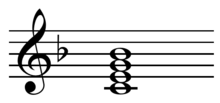
A tetrad is a set of four notes in music theory. When these four notes form a tertian chord they are more specifically called a seventh chord, after the diatonic interval from the root of the chord to its fourth note (in root position close voicing). Four-note chords are often formed of intervals other than thirds in 20th- and 21st-century music, however, where they are more generally referred to as tetrads (see, for example, Hanson 1960, 18, 22, 28, 32, et passim, Gamer 1967, 37 & 52, and Forte 1985, 48–51, 53). Allen Forte in his The Structure of Atonal Music never uses the term "tetrad", but occasionally employs the word tetrachord to mean any collection of four pitch classes (Forte 1973, 1, 18, 68, 70, 73, 87, 88, 21, 119, 123, 124, 125, 138, 143, 171, 174, and 223). In 20th-century music theory, such sets of four pitch classes are usually called "tetrachords" (Anon. 2001; Roeder 2001).
